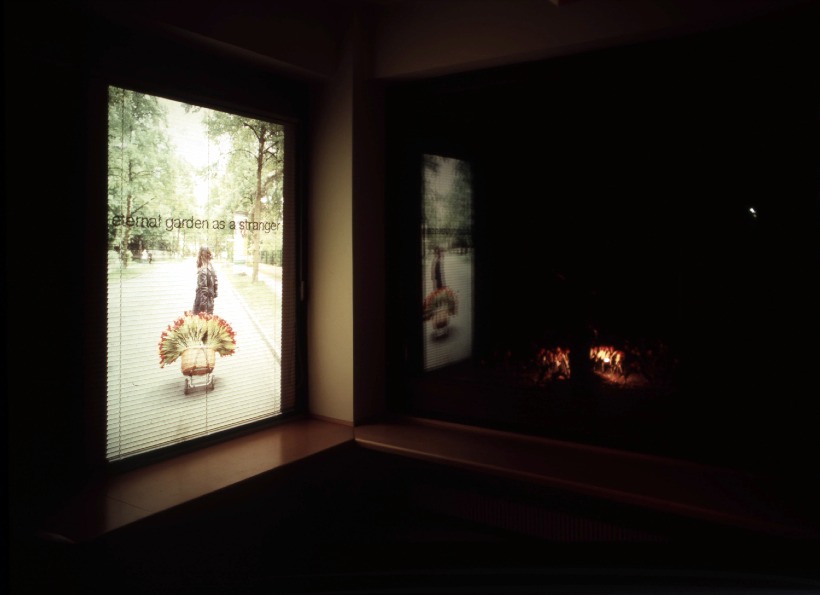| eternal garden Berlin, as a stranger / 2006 - 2007 | ||||||||||||||
Dia film, slide projector

Megumi Fukuda - Re-mapping Berlin as a young tulipe lady
by Shintaro Miyazaki
If you have seen a strange japanese young women planting some red tulips in some unused deserted space somewhere in Berlin-Mitte then it was maybe Megumi Fukuda.
With her latest public intervention artwork "Eternal Garden Berlin as a stranger" she tried to explore the boundaries between public and private, between her and the metropolis berlin, but also between real and fake, between art and nature, because the tulips were artificial: Made of plastic. Additionally as the title of her work implies she also reflected what is the difference of ephemeral and eternal.
"Eternal Garden Berlin as a stranger" was wandering from one unused space to another during a year (from 14th May 2006 to 15th May 2007) and occupied 31 places near Gartenstraße, Tucholskystraße or Alexanderplatz...
...and many other with lovely but artificial red tulips.
Each time when she made a short intervention she used about 200 to 400 tulips. Interestingly enough the whole intervention lasted usually only four hours. When the tulips were planted and the result documented, the artwork was removed again and the deserted space got lifeless again. Like it were a dream the beautiful flowers disappear again. Fukuda moves to another place. Life goes on. Life is ephemeral?
In that way the strange "tulipe lady", who was also a stranger in Berlin got to known the city a little better. She also experience how "germany works" but also life itself, as she said. Fukuda tried to re-map Berlin in her own mind by acting in spaces between public and private. By jumping in at the deep end directly to the city of Berlin, she had a lot of contact with several people watching her planting the tulips, asking her what she is doing or accusing her as a tulip thief. Often the people didnt understand that the whole intervention supposed to be a kind of art. An artwork about transitions about the ephemeral or was it about the eternal?
Berlin as a city in transition is the best place to reflect our being as global nomads, as hypertourists. With this in mind this project might also be the reflection of our status quo in our society. Fukuda wanted to bring with her public interventions our thought exactly to this fact that everything is in transition: Even our homes.
Asked in her new home, which is in Berlin-Mitte, why she uses artificial tulips, she answers that for her tulips are not artificial but also natural. It is not important to her that the tulips are just fake! This is a genuine japanese approach. The japanese culture treats artefacts or materials like wood, stone, metal also like nature, like a important object, which means that there is a soul in every artefact. Therefore the articial tulips are not dead but living objects. Maybe hyper-realistic objects? Maybe she wants to hint us that human life itself is full or artefacts which are not dead, but full or energy and life?
Interestingly she often revitalized dead places to beautiful colorful places by using artificial dead material. But there are also practical reasons for using plastic tulips: Mobility. All locations where she planted her tulips where reachable from her home with bicycle or by foot.
Fukuda had already before a soft spot for nature and for flowers as her grandparents were gardeners in post-war Hiroshima. Like Fukuda they rehabilitated the gardens of Hiroshima, which were distroyed due to the atomic bomb. Actually the project started in Hiroshima where Megumi Fukuda could use the old japanese style detached house of her deceased grandparents in spring 2003.
Now after "Eternal Garden Berlin as a stranger" is finished she is collaborating with Kunieda Katsura for a new project by planting now a "real" garden! The project is called: "Eternity and a day. " Here the whole projects gets another twist.
Megumi Fukuda, is a scholarship holder of the pola-art-foundation (2006) and studied under Rebecca Horn, Faculty of Fine Art, UdK-Berlin, in Hannover and in Hiroshima. She lives and works since 2005 in Berlin.
> interview and text by Shintaro Miyazaki (la condition japonaise) >> site





